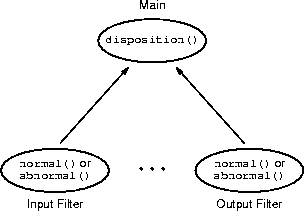- Normal termination proceeds from input to output.
- Any filter may terminate abnormally.
- A filter normally terminating out of sequence is an abnormal termination.

class KWICIndexEntry static KWICIndexEntry [] entries(String description) private KWICIndexEntry(String words[], int index_word) boolean less(KWICIndexEntry kie) public String toString()
See the complete code.
public void
run()
while true
Object o = input_object()
if (o == null) break
if !isValidObject(o)
throw new Error()
o = process_input(o)
output_object(o)
end_loop()
abstract class FilterRunnableTemplate
implements Runnable
abstract protected boolean isValidObject(Object o)
abstract protected void process_input(Object o)
protected buffer inb, outb
protected void end_loop()
try outb.put(null)
catch (InterruptedException ie) { }
FilterRunnable(buffer ib, buffer ob)
inb = ib
outb = ob
protected Object input_object()
try return inb.get()
catch (InterruptedException ie)
throw new Error()
protected void output_object(Object o)
try outb.put(o)
catch (InterruptedException ie)
throw new Error()
public void run()
// As before.
See the complete code.
protected void process_input(Object o)
KWICIndexEntry entries[] =
KWICIndexEntry.entries((String) o)
if entries != null
try outb.put(o)
catch (InterruptedException ie) return
See the complete code.
protected void end_loop()
try
KWICIndexEntry db[] =
new KWICIndexEntry[descriptions.size()]
descriptions.toArray(db)
outb.put(db)
outb.put(null)
catch (Exception ie)
throw new RuntimeException()
See the complete code.
protected void
output_object(Object o)
KWICIndexEntry [] ieg = (KWICIndexEntry []) o
for (int i = 0; i < ieg.length; i++)
System.out.println(ieg[i])
See the complete code.
interface TerminationInterface void normal(int id) void abnormal(int id)

class PAFTermination
implements TerminationInterface
final static int
unterminated = 0
normal = 1
abnormal = 2
final private int status[];
int check()
int i = 0
while (i < status.length) && (status[i] == normal)
i++
if i == status.length
return normal
while (i < status.length) && (status[i] == unterminated)
i++
return i == status.length ? unterminated : abnormal
synchronized int disposition()
// Wait until all threads have terminated normally,
// or a thread terminates abnormally.
while true
try wait()
catch (InterruptedException ie)
return abnormal
final int i = check()
if (i != unterminated) return i
synchronized void abnormal(int id)
// Process id terminates abnormally.
status[id] = abnormal
notify()
synchronized void normal(int id)
// Process id terminates normally.
status[id] = normal
notify()
See the complete code.
ti.
ti.
ti.normal() or ti.abnormal().
ti.disposition().

class StoppingThread extends Thread
private final TerminationInterface halter;
private final int id;
StoppingThread
(int id, TerminationInterface halter, Runnable r)
super(r)
this.halter = halter
this.id = id
public void run()
boolean normal = true
try super.run()
catch (Exception e)
normal = false
if normal halter.normal(id);
else halter.abnormal(id);
class kwic {
public static void main(String[] args)
buffer b1, b2, b3
StoppingThread threads[] = new StoppingThread[4]
PAFTermination halter = new PAFTermination(4)
InputFilter if = new InputFilter("input", b1)
RotateFilter rf = new RotateFilter("rotate", b1, b2)
SortFilter sf = new SortFilter("sort", b2, b3)
OutputFilter of = new OutputFilter("output", b3)
threads[0] = new StoppingThread(0, halter, if)
threads[1] = new StoppingThread(1, halter, rf)
threads[2] = new StoppingThread(2, halter, sf)
threads[3] = new StoppingThread(3, halter, of)
for (int i = 0; i < threads.length; i++)
threads[i].start()
if halter.disposition() != PAFTermination.normal
System.out.println("Abnormal termination.")
for (int i = 0; i < threads.length; i++)
if threads[i].isAlive()
threads[i].interrupt()
This page last modified on 9 August 2002.